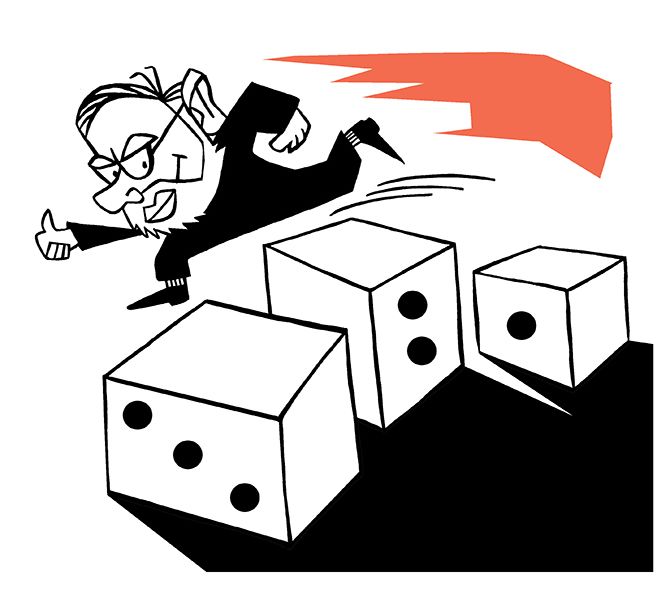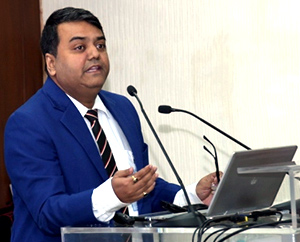'The government and the RBI have been playing a very good part in terms of inflation management.'

Illustration: Uttam Ghosh/Rediff.com
In the first part of his eloquent interview with Rediff.com's Vaihayasi Pande Daniel, Soumya Kanti Ghosh explained how India will spend part of next year recovering from demonetisation and GST and after that its key financial indicators should reflect a bounce back.
"Inflation, which was in double digits -- 9 to 10 percent earlier -- now has been structurally corrected to 4 to 5 percent," Dr Ghosh, group chief economic advisor at the State Bank of India, points out in this, the second of a multi-part interview.
"Of course, it is part of RBI monetary policy, but it also has to do with the government's food supply management. Because food prices has the largest weight in connection with inflation."
- Part 1 of the Interview: 'Recovery could be a couple of quarters away'
Was demonetisation implemented in too much haste?
Of course, we can always debate whether the implementation could have been done better. That's something which we need to take care of better.
But whenever we are doing a reform of such an extent, where 86 per cent of the currency is taken out of the system, there will always be some nitty-gritty (involved).
They needed to keep it a secret.
If suppose the RBI had started printing the money (earlier) people would have actually gauged that something was happening. So the government had to keep a secret.
I believe it was a delicate balancing that the government and the RBI did.
Possibly you need to give the benefit of doubt to both of them, because this intention of cleaning up the currency was a very honest intention.
And the timing of GST with respect to demonetisation? Too quickly?
I agree that GST and demonetisation came in very quick time and these were two structural transformations of such enormous levels.
The economy, of course, has been impacted by some sort of growth slowdown.
But let me put a counter question: If suppose July 2017 was not the date (for implementing GST), when it could have been done?
It could have been done in July 2018. Or even in November 2017.
As you see, even after rolling it out in July 2017, there are so many teething troubles. It may actually take a year for GST to stabilise.
Suppose it was implemented in November 2017. The entire 2018 would have gone in stabilising GST. That would not have given the government benefits in terms of the full electoral cycle.
So even though I appreciate your point that between GST and demonetisation, the time lapse was not given, I think there was no other opportune time apart from July 2017.
Any other time beyond that would not have given the economy time to adjust into the new equilibrium phase.
It is very important for the government to give time to adjust into the new equilibrium phase, in the current electoral cycle. So that's the argument.

Supposing you were the man in the hot seat at the RBI facing Mr Modi, would you have taken on demonetisation?
I don't want to comment too much on this economic decision.
My point is very simple. I work in an organisation. Suppose that organisation takes 100 decisions. I may believe in 99 of them. But I may not believe in one of them. But when an organisation announces a decision, all the stake holders need to go with it.
It is not correct to say that someone was in disagreement or agreement, because at the end of the day, the decision has been made.
Even though some stakeholders may not be in entire agreement or disagreement, he or she has to go with it.
That's the only limited point which I want to highlight.
It seems that an idea like demonetisation was floating around for a long time. When did it first, as far as you know, come up as something that should be done for the Indian economy?
I don't think it was floating around for a long time.
Obviously there have been discussions; there has been writing in the public domain saying that high currency notes begets high values of corruption.
There may have been presentations made to the government, I don't know. I have heard about it. There were some sort of discussions. Some presentation has been made to them.
And these movers -- as the government kept saying -- kept it a well guarded secret throughout the entire period, otherwise the efficacy of that move would have been completely lost.
That is exactly the point that I want to mention as a reply to one of your earlier questions -- could the government have been better prepared?
Of course, the government and the RBI could have been better prepared.
There is also another side to this better preparedness. If suppose the RBI was printing currency notes, in advance, say three to four months in advance, the market would have known something is amiss, and something is going to happen.
There are always two sides of the same story in terms of preparedness.
With PM Modi at the helm, is the economy in good hands?
There seems to be conflicting signals here. The market seems to be booming. Mr Modi seems to be keeping inflation in check.
Who do we give credit? Who do we put faith in?
You have to give very good credit to Modi.
The government and the RBI have been playing a very good part in terms of inflation management.
Inflation, which was in double digits -- 9 to 10 percent earlier -- now has been structurally corrected to 4 to 5 percent.
Of course, it is part of RBI monetary policy, but it also has to do with the government's food supply management. Because food prices has the largest weight in connection with inflation.
If you compare the prices, where they were in 2014, and what they are today, you will find that there has been not significant movement.
For example, the index of vegetable prices (now) and what it was in May 2014. Therefore, (it has been good) food supply management.
On the fiscal side, if you look at the fiscal deficit, the deficit is now down to 3.5 per cent. It was more, just close to 5 percent two to three years back.
Look at the current account deficit.
The current account deficit, even though there has been some increase last time, the current account deficit has been significantly lower.
Look into any of the numbers (there is improvement)... of course, there will be some numbers that could be improved.
For example, the bank credit growth is one of the numbers which could be improved.
But the overall macro numbers, in terms of the fiscal deficit, the current account deficit, inflation, even the interest rates (all of them have improved).
The interest rates have also moved down significantly lower. There have been significant movements and, I repeat, a lot of the policy changes the government is actually doing, that is being done with the objective of a long term period in mind.
So therefore, you can see a host of lot of changes.
For instance, I heard a report that said the pension system is now showing positive results.
We have done an internal study on the Jan Dhan account (Pradhan Mantri Jan Dhan Yojana) where we found out that in states with higher rural population, the Jan Dhan account is leading to a shift in behavioural changes on the part of the poor.
For example, the poor are (taking less) intoxicants.
They are (keeping) their money in the banks and are also spending their money on medical emergencies.
These are the non-structural changes happening in the economy.
Overall, I feel the economy has moved majorly ahead in the last 2 to 3 years from what it was earlier if you purely look at the data part.
India's jump of 30 notches in the World Bank's ease of doing business rankings indicates that the reform measures of the current government are finally bearing fruit.
India stands at 100th for 2018 compared to 130th last year.
Out of the 10 parameters on which the ease of doing business rank gets calculated, India has shown improvement in 6 parameters with a notable jump registered in paying taxes (a 53 place jump) due to the development of online tax infrastructure (tax returns are now e-filled, refunds are processed electronically and so on) and beginning of insolvency resolution (a 33-place jump) due to enactment of the Insolvency and Bankruptcy Act.
DON'T MISS the next part of the interview later this week!











 © 2025
© 2025